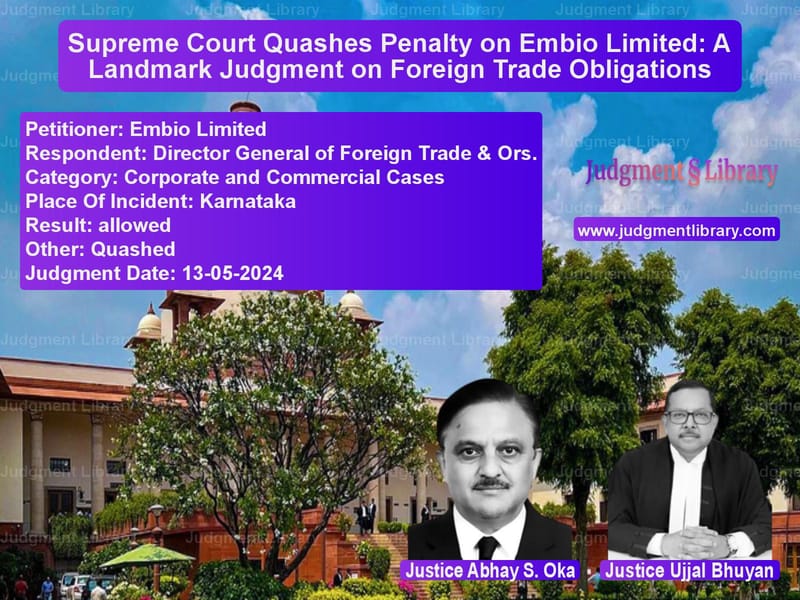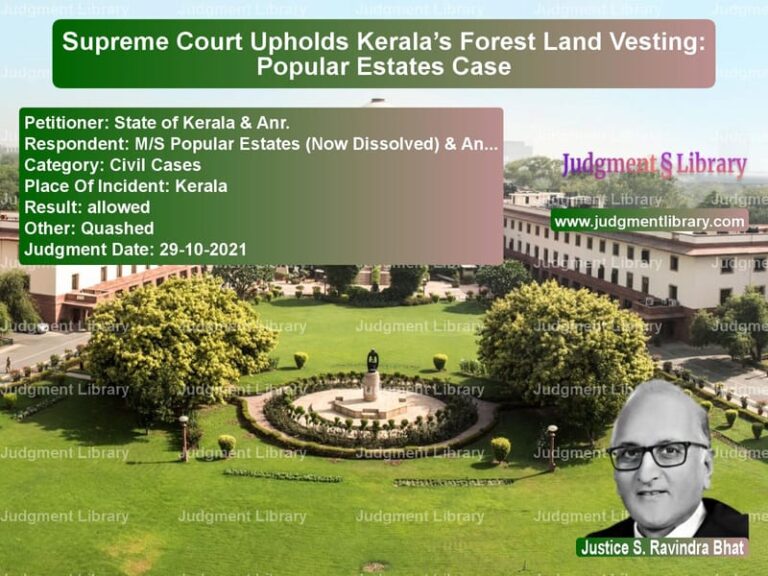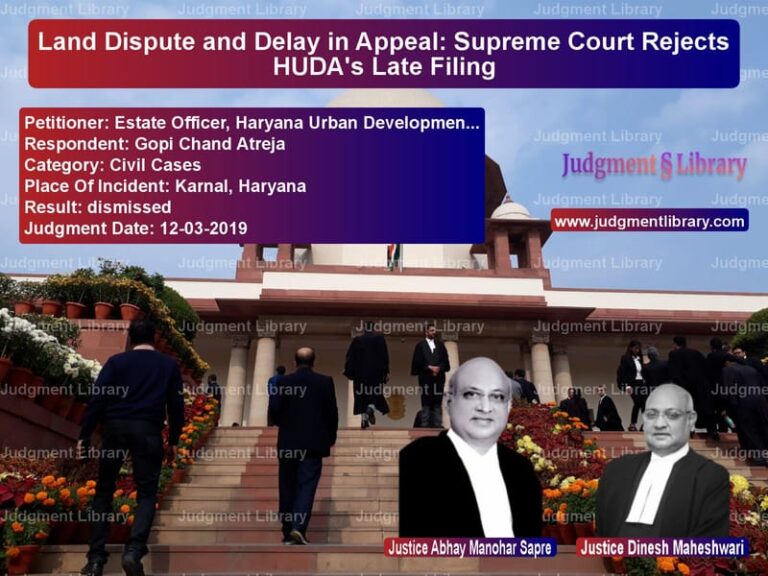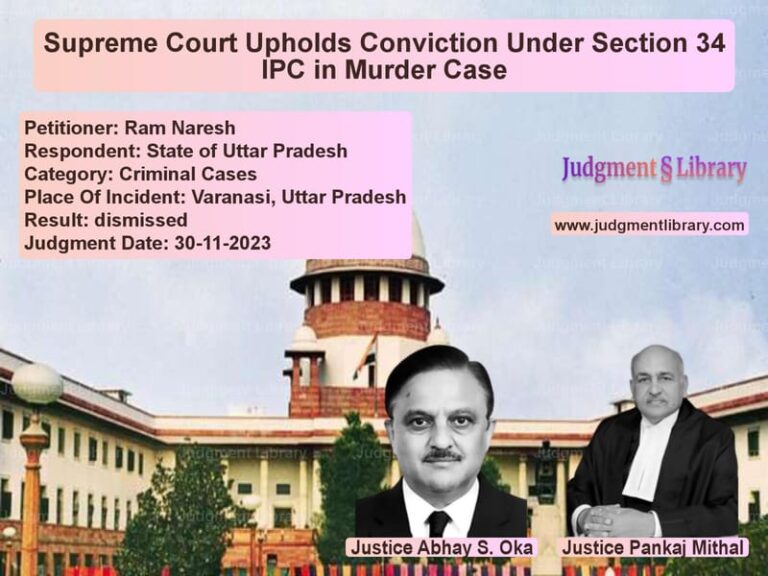Supreme Court Quashes Penalty on Embio Limited: A Landmark Judgment on Foreign Trade Obligations
The case of Embio Limited vs. Director General of Foreign Trade & Ors. is a significant ruling by the Supreme Court of India concerning the imposition of penalties under the Foreign Trade (Development and Regulation) Act, 1992 (FT Act). The Court quashed the penalty of Rs. 23,38,882/- imposed on the appellant, ruling that the penalty was unjustified as the company had not violated any provisions of the FT Act.
Background of the Case
The dispute arose when Karnataka Malladi Biotics Limited (later merged with Embio Limited) was granted an Export Promotion Capital Goods (EPCG) License under the FT Act. This license allowed the company to import capital goods at a concessional duty rate, provided that it exported goods worth US$ 2,59,948 within five years. However, due to financial difficulties, Karnataka Biotics was declared a sick company under the Sick Industrial Companies (Special Provisions) Act, 1985 (SICA), and could not fulfill its export obligations.
Key Facts of the Case
- 1999: Karnataka Biotics was declared a sick unit by the Board for Industrial Finance and Reconstruction (BIFR).
- 2003: BIFR sanctioned a rehabilitation scheme, granting customs duty waivers for the company.
- 2004: The Director General of Foreign Trade (DGFT) imposed a penalty of Rs. 23,38,882/- for non-fulfillment of the export obligation.
- 2009: Karnataka Biotics was amalgamated with Embio Limited.
- 2017: The Karnataka High Court dismissed Embio’s writ petition challenging the penalty.
- 2024: The Supreme Court quashed the penalty.
Legal Issues Considered
The Supreme Court addressed several critical legal questions:
- Whether the non-fulfillment of export obligations under the EPCG scheme constituted a violation of Section 11(2) of the FT Act.
- Whether the penalty imposed on the appellant was legally justified.
- Whether the Karnataka High Court erred in dismissing the appellant’s writ petition.
Arguments by the Petitioner (Embio Limited)
The appellant argued that:
- The rehabilitation scheme approved by BIFR included a waiver of customs duty, making the penalty redundant.
- The penalty was imposed without proving that Embio had violated any provision of the FT Act.
- The Karnataka High Court incorrectly ruled that the company had no right to re-agitate the issue after amalgamation.
Arguments by the Respondents (DGFT & Government of India)
The government contended that:
- The penalty was imposed due to the company’s failure to meet its export obligations.
- The customs duty waiver did not extend to penalties imposed under the FT Act.
- The Karnataka High Court correctly dismissed the writ petition.
Supreme Court’s Judgment
The Supreme Court ruled in favor of the appellant and quashed the penalty. The key observations made by the Court include:
“Section 11(2) of the FT Act applies only when an entity attempts to make an import or export in contravention of the Act. Non-fulfillment of an export obligation does not constitute such a contravention.”
- The Court found that the penalty was wrongly imposed, as the appellant had not attempted to make an illegal export or import.
- The rehabilitation scheme approved by BIFR had granted a waiver of customs duty, which logically should have included relief from penalties related to the same obligation.
- The Karnataka High Court’s ruling was flawed as it ignored the fact that the appellant had been expressly granted liberty to file a fresh writ petition.
Implications of the Judgment
The ruling has significant implications for companies dealing with foreign trade regulations:
- Clearer Interpretation of Section 11(2): The judgment clarifies that failure to meet export obligations does not automatically attract penalties under the FT Act.
- Protection for Sick Companies: Firms undergoing rehabilitation cannot be arbitrarily penalized if their export obligations remain unfulfilled due to financial distress.
- Judicial Oversight: The decision reinforces that courts must ensure penalties are imposed strictly within the legal framework.
Conclusion
The Supreme Court’s decision in Embio Limited vs. Director General of Foreign Trade is a landmark ruling that protects businesses from unjustified penalties. The judgment ensures that regulatory bodies cannot impose penalties without clear statutory backing, reinforcing the importance of due process in foreign trade regulations.
Petitioner Name: Embio Limited.Respondent Name: Director General of Foreign Trade & Ors..Judgment By: Justice Abhay S. Oka, Justice Ujjal Bhuyan.Place Of Incident: Karnataka.Judgment Date: 13-05-2024.
Don’t miss out on the full details! Download the complete judgment in PDF format below and gain valuable insights instantly!
Download Judgment: embio-limited-vs-director-general-of-supreme-court-of-india-judgment-dated-13-05-2024.pdf
Directly Download Judgment: Directly download this Judgment
See all petitions in Company Law
See all petitions in Judgment by Abhay S. Oka
See all petitions in Judgment by Ujjal Bhuyan
See all petitions in allowed
See all petitions in Quashed
See all petitions in supreme court of India judgments May 2024
See all petitions in 2024 judgments
See all posts in Corporate and Commercial Cases Category
See all allowed petitions in Corporate and Commercial Cases Category
See all Dismissed petitions in Corporate and Commercial Cases Category
See all partially allowed petitions in Corporate and Commercial Cases Category







